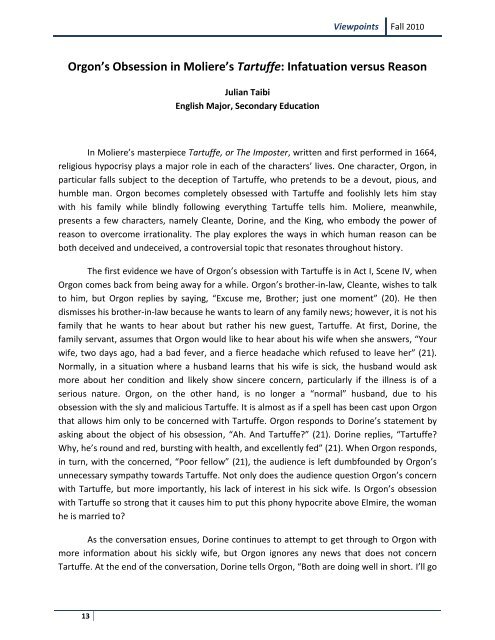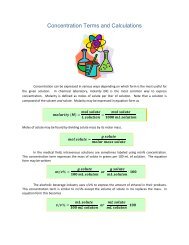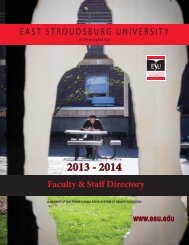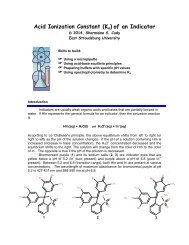Orgon's Obsession in Moliere's Tartuffe
Orgon's Obsession in Moliere's Tartuffe
Orgon's Obsession in Moliere's Tartuffe
Create successful ePaper yourself
Turn your PDF publications into a flip-book with our unique Google optimized e-Paper software.
13<br />
Viewpo<strong>in</strong>ts Fall 2010<br />
Orgon’s <strong>Obsession</strong> <strong>in</strong> Moliere’s <strong>Tartuffe</strong>: Infatuation versus Reason<br />
Julian Taibi<br />
English Major, Secondary Education<br />
In Moliere’s masterpiece <strong>Tartuffe</strong>, or The Imposter, written and first performed <strong>in</strong> 1664,<br />
religious hypocrisy plays a major role <strong>in</strong> each of the characters’ lives. One character, Orgon, <strong>in</strong><br />
particular falls subject to the deception of <strong>Tartuffe</strong>, who pretends to be a devout, pious, and<br />
humble man. Orgon becomes completely obsessed with <strong>Tartuffe</strong> and foolishly lets him stay<br />
with his family while bl<strong>in</strong>dly follow<strong>in</strong>g everyth<strong>in</strong>g <strong>Tartuffe</strong> tells him. Moliere, meanwhile,<br />
presents a few characters, namely Cleante, Dor<strong>in</strong>e, and the K<strong>in</strong>g, who embody the power of<br />
reason to overcome irrationality. The play explores the ways <strong>in</strong> which human reason can be<br />
both deceived and undeceived, a controversial topic that resonates throughout history.<br />
The first evidence we have of Orgon’s obsession with <strong>Tartuffe</strong> is <strong>in</strong> Act I, Scene IV, when<br />
Orgon comes back from be<strong>in</strong>g away for a while. Orgon’s brother-<strong>in</strong>-law, Cleante, wishes to talk<br />
to him, but Orgon replies by say<strong>in</strong>g, “Excuse me, Brother; just one moment” (20). He then<br />
dismisses his brother-<strong>in</strong>-law because he wants to learn of any family news; however, it is not his<br />
family that he wants to hear about but rather his new guest, <strong>Tartuffe</strong>. At first, Dor<strong>in</strong>e, the<br />
family servant, assumes that Orgon would like to hear about his wife when she answers, “Your<br />
wife, two days ago, had a bad fever, and a fierce headache which refused to leave her” (21).<br />
Normally, <strong>in</strong> a situation where a husband learns that his wife is sick, the husband would ask<br />
more about her condition and likely show s<strong>in</strong>cere concern, particularly if the illness is of a<br />
serious nature. Orgon, on the other hand, is no longer a “normal” husband, due to his<br />
obsession with the sly and malicious <strong>Tartuffe</strong>. It is almost as if a spell has been cast upon Orgon<br />
that allows him only to be concerned with <strong>Tartuffe</strong>. Orgon responds to Dor<strong>in</strong>e’s statement by<br />
ask<strong>in</strong>g about the object of his obsession, “Ah. And <strong>Tartuffe</strong>?” (21). Dor<strong>in</strong>e replies, “<strong>Tartuffe</strong>?<br />
Why, he’s round and red, burst<strong>in</strong>g with health, and excellently fed” (21). When Orgon responds,<br />
<strong>in</strong> turn, with the concerned, “Poor fellow” (21), the audience is left dumbfounded by Orgon’s<br />
unnecessary sympathy towards <strong>Tartuffe</strong>. Not only does the audience question Orgon’s concern<br />
with <strong>Tartuffe</strong>, but more importantly, his lack of <strong>in</strong>terest <strong>in</strong> his sick wife. Is Orgon’s obsession<br />
with <strong>Tartuffe</strong> so strong that it causes him to put this phony hypocrite above Elmire, the woman<br />
he is married to?<br />
As the conversation ensues, Dor<strong>in</strong>e cont<strong>in</strong>ues to attempt to get through to Orgon with<br />
more <strong>in</strong>formation about his sickly wife, but Orgon ignores any news that does not concern<br />
<strong>Tartuffe</strong>. At the end of the conversation, Dor<strong>in</strong>e tells Orgon, “Both are do<strong>in</strong>g well <strong>in</strong> short. I’ll go
14<br />
Viewpo<strong>in</strong>ts Fall 2010<br />
and tell Madame that you’ve expressed keen sympathy and anxious <strong>in</strong>terest” (Moliere 23).<br />
Through this statement, we can see that Dor<strong>in</strong>e is just as puzzled as the audience is and that<br />
she can do noth<strong>in</strong>g but laugh <strong>in</strong> utter disbelief at the hypnotized Orgon.<br />
What does Orgon f<strong>in</strong>d so magnificent about <strong>Tartuffe</strong> that causes him to display such an<br />
<strong>in</strong>fatuation? The playwright answers this question <strong>in</strong> Act I, Scene V, when Orgon recollects the<br />
first time he met <strong>Tartuffe</strong>. Although Orgon offers a reason both for his <strong>in</strong>terest and for his belief<br />
as to why <strong>Tartuffe</strong> seems like such a religious and humble man, the audience can see that his<br />
judgment is extremely weak. Orgon attempts to expla<strong>in</strong>s his <strong>in</strong>terest <strong>in</strong> <strong>Tartuffe</strong>—“He *<strong>Tartuffe</strong>+<br />
is a man who…a man who…an excellent man” (25)—and <strong>in</strong> his stutter<strong>in</strong>g statement, we can see<br />
how Orgon has lost his ability to rationally evaluate anyth<strong>in</strong>g at all. What Orgon says next is<br />
extremely irrational. He comments, “My mother, children, brother, and wife could die, and I’d<br />
not feel a s<strong>in</strong>gle moment’s pa<strong>in</strong>” (25). After Orgon makes this claim, the audience likely expects<br />
him to come to his senses and realize the severity of tell<strong>in</strong>g his brother-<strong>in</strong>-law that he would<br />
feel noth<strong>in</strong>g if his family died. However, Orgon cont<strong>in</strong>ues to justify his th<strong>in</strong>k<strong>in</strong>g, ignor<strong>in</strong>g the<br />
sarcasm of Cleante’s comment, “That’s a f<strong>in</strong>e sentiment, Brother; most humane” (25). By<br />
free<strong>in</strong>g his soul “from earthly loves, and every human tie,” Orgon is almost try<strong>in</strong>g to become a<br />
missionary figure <strong>in</strong> his obsession with <strong>Tartuffe</strong>, putt<strong>in</strong>g aside his own earthly cares <strong>in</strong> favor of<br />
what he perceives to be more spiritual matters: the person of <strong>Tartuffe</strong> himself. Orgon believes<br />
that <strong>Tartuffe</strong> is a sa<strong>in</strong>t because he flaunts his humbleness around the church while publicly<br />
perform<strong>in</strong>g m<strong>in</strong>or tasks <strong>in</strong> church, often pray<strong>in</strong>g loudly, and how modest he is when accept<strong>in</strong>g<br />
only small gifts. It is obvious to all of the other characters and to the audience as well that<br />
<strong>Tartuffe</strong> merely uses religious acts <strong>in</strong> order to appear religious himself. It almost seems as if<br />
Orgon is jok<strong>in</strong>g when he says, “Last week, his *<strong>Tartuffe</strong>’s] conscience was severely pricked<br />
because, while he was pray<strong>in</strong>g, he had caught a flea and killed it, so he felt, too wrathfully”<br />
(Moliere 26). However, Orgon simply reveals his own misguided fixation on <strong>Tartuffe</strong>’s apparent<br />
unassailable goodness.<br />
Cleante then makes a remark that caused much controversy <strong>in</strong> Versailles and<br />
throughout France <strong>in</strong> 1664 when the play was first performed. He replies, “There’s a vast<br />
difference, so it seems to me, between true piety and hypocrisy: How do you fail to see it, may I<br />
ask? Is not a face quite different than a mask?” (27). This remark is perhaps the essence of<br />
Moliere’s motivation for writ<strong>in</strong>g this play. In the 1660s <strong>in</strong> the official French royal court of<br />
Versailles and throughout France, there were more than a few highly prom<strong>in</strong>ent and<br />
supposedly religious and pious people <strong>in</strong> power that Moliere could clearly see were hypocrites<br />
and not people of God with pure <strong>in</strong>tentions. Moliere endeavored to expose these deceptive<br />
authorities or at least provoke questions with<strong>in</strong> his audience. Also, s<strong>in</strong>ce Moliere wrote dur<strong>in</strong>g<br />
the beg<strong>in</strong>n<strong>in</strong>g of the Age of Reason, people were beg<strong>in</strong>n<strong>in</strong>g to demand adherence to common<br />
sense <strong>in</strong> decision-mak<strong>in</strong>g and behavior that was rational. As the character Orgon displays hardly
15<br />
Viewpo<strong>in</strong>ts Fall 2010<br />
any common sense at all and, at the same time, is speak<strong>in</strong>g primarily about Christianity, people<br />
rioted and some authorities demanded that the play be banned on the basis that Moliere had<br />
ridiculed both religious and secular authorities for their lack of piety and absence of reason.<br />
We can see a perfect example of the comb<strong>in</strong>ation of the absences of these two<br />
qualities—piety and reason—when Cleante says, “Good God, man! Have you lost your common<br />
sense?” (26). Because Orgon follows what seem to be the tenets of Christianity, and at the<br />
same time his character portrays a person lack<strong>in</strong>g reason and rationality, some audience<br />
members misconstrued Moliere’s message and assumed that the playwright had argued that<br />
Christianity was synonymous with a lack of the ability to reason with clarity and <strong>in</strong>telligence. In<br />
his 1963 article “<strong>Tartuffe</strong>, Religion, and Courtly Culture,” published <strong>in</strong> French Historical Studies,<br />
Emanuel Chill addresses how the dévots, the followers of Card<strong>in</strong>al Pierre de Berulle, found the<br />
play extremely offensive. Chill expla<strong>in</strong>s that the orig<strong>in</strong>al version of the play was probably even a<br />
lot stronger <strong>in</strong> its social criticism than the versions we have today. Reflect<strong>in</strong>g on the content of<br />
the orig<strong>in</strong>al version and the decision mak<strong>in</strong>g process of the theatre company to edit the work,<br />
Chill notes, “it is clear that the surviv<strong>in</strong>g remnant of the Company was moved to exert great<br />
pressure aga<strong>in</strong>st <strong>Tartuffe</strong>, and that its ‘excitation’ resulted <strong>in</strong> the royal prohibition of its public<br />
performance” (Chill 155). Thus, <strong>in</strong> 1664, the play was banned because of the bad effect it<br />
produced <strong>in</strong> challeng<strong>in</strong>g authority. In his PMLA essay “<strong>Tartuffe</strong> and the Mysteries” (1977),<br />
Marcel Gutwirth states, “The challenge laid down by the comedy of <strong>Tartuffe</strong> was of a<br />
magnitude the age could not afford to ignore. Moliere’s plea for the purity of the play’s<br />
<strong>in</strong>tentions had been swept aside with the gruff retort: ‘It is not the bus<strong>in</strong>ess of the stage to be<br />
preach<strong>in</strong>g the Gospel’” (Gutwirth 36).<br />
Orgon’s obsession with <strong>Tartuffe</strong> reaches its climax <strong>in</strong> Act III when Damis, Orgon’s son,<br />
attempts to uncover <strong>Tartuffe</strong>’s true face. As Damis listens to <strong>Tartuffe</strong>’s advances on Elmire, he<br />
cannot help himself and bursts out of hid<strong>in</strong>g <strong>in</strong> order to prove <strong>Tartuffe</strong>’s treachery. When<br />
Orgon arrives on the scene, however, Orgon acts <strong>in</strong> the same irrational, absurd way that def<strong>in</strong>es<br />
his character thus far <strong>in</strong> the play. He is now completely deceived, which plays <strong>in</strong>to the hands of<br />
<strong>Tartuffe</strong> perfectly. Instead of deny<strong>in</strong>g the accusations, <strong>Tartuffe</strong> ma<strong>in</strong>ta<strong>in</strong>s his pious posture and<br />
then over-exaggerates the role of a s<strong>in</strong>ner. <strong>Tartuffe</strong> says, “Yes Brother, I’m a wicked man, I fear:<br />
a wretched s<strong>in</strong>ner, all depraved and twisted, the greatest villa<strong>in</strong> that has ever existed” (97). This<br />
moment <strong>in</strong> the play is ironic because <strong>Tartuffe</strong> actually admits to his wrongdo<strong>in</strong>g, but s<strong>in</strong>ce<br />
Orgon bl<strong>in</strong>dly believes that <strong>Tartuffe</strong> can do no evil, he refuses to listen to the accusation and<br />
consequently turns on his own son, Damis. Orgon has become so obsessed with the notion of<br />
<strong>Tartuffe</strong>’s sa<strong>in</strong>tly piety that he kicks Damis out of his house – hardly an act that would come<br />
from a religious, or even a sane person. Orgon ends the scene by say<strong>in</strong>g to Damis, “Well go<br />
quickly then. I dis<strong>in</strong>herit you; an empty purse is all you’ll get from me – except my curse!” (102).
16<br />
Viewpo<strong>in</strong>ts Fall 2010<br />
In Act IV, Elmire devises a plan <strong>in</strong> which Orgon will hide under a table while she and<br />
<strong>Tartuffe</strong> have a conversation that will expose <strong>Tartuffe</strong>’s hypocrisy. It is the ultimate plan—one<br />
based on the age-old adage that “see<strong>in</strong>g is believ<strong>in</strong>g”—to put a f<strong>in</strong>al stop to Orgon’s mad<br />
obsession with the false fiend. With a little conv<strong>in</strong>c<strong>in</strong>g, Elmire causes <strong>Tartuffe</strong> to come onto her<br />
once aga<strong>in</strong> <strong>in</strong> a sexual advance, thereby prov<strong>in</strong>g that he is a fraud. However, <strong>in</strong> Act IV, Scene V,<br />
Moliere’s humor is quite apparent as Elmire coughs several times, warn<strong>in</strong>g her husband that he<br />
should come out of hid<strong>in</strong>g immediately and reprimand <strong>Tartuffe</strong>. Because of his bl<strong>in</strong>d faith <strong>in</strong><br />
<strong>Tartuffe</strong>, though, Orgon still refuses to believe what he hears and does not come out after the<br />
first or even second time his wife coughs. <strong>Tartuffe</strong>’s hypocrisy must be fully exposed <strong>in</strong> order<br />
for Orgon to work his way out from under the table. When he f<strong>in</strong>ally comes out of hid<strong>in</strong>g, he<br />
exclaims, “That man’s a perfect monster, I must admit! I’m simply stunned. I can’t get over it”<br />
(129).<br />
Although the play focuses on <strong>Tartuffe</strong>’s deception of Orgon, <strong>Tartuffe</strong> greatly affects the<br />
other characters of the play. Cleante, who represents the voice of rationality and reason<br />
throughout the play, is constantly <strong>in</strong> a struggle to help Orgon come to his senses. In Scene 1,<br />
Act IV, as Cleante talks with <strong>Tartuffe</strong>, Cleante uses logic to po<strong>in</strong>t out the hypocrisies of<br />
<strong>Tartuffe</strong>’s actions. Cleante argues, “Your reason<strong>in</strong>g is badly warped and stretched, and these<br />
excuses, Sir, are most far-fetched” (110). As <strong>Tartuffe</strong> tries to justify his tak<strong>in</strong>g Damis’s money<br />
and estate, he expostulates, “Lest so much wealth fall <strong>in</strong>to wicked hands, lest those to whom it<br />
might descend <strong>in</strong> time turn it to purposes of s<strong>in</strong> and crime” (111). This quote, of course, is<br />
extremely ironic: There can be no more wicked hands that the money could fall <strong>in</strong>to than<br />
<strong>Tartuffe</strong>’s. Cleante then reasons that Damis, be<strong>in</strong>g Orgon’s son, should be the first <strong>in</strong> control of<br />
the family’s money, and also, po<strong>in</strong>ts that it is not a pious action to be the cause of a son’s<br />
dis<strong>in</strong>heritance. Cleante advances the argument skillfully by evok<strong>in</strong>g the pr<strong>in</strong>ciple of piety, “Does<br />
true religion teach that lawful heirs may freely be deprived of what is theirs?” (112). Cleante’s<br />
po<strong>in</strong>t is valid, especially given that <strong>Tartuffe</strong> has no claim to the family’s wealth and is merely a<br />
stranger who manipulates those around him. Cleante’s logical reason<strong>in</strong>g proves to be<br />
overwhelm<strong>in</strong>g, and consequently, <strong>Tartuffe</strong> <strong>in</strong>terrupts him to say that he has “certa<strong>in</strong> pious<br />
duties to attend to” (112), thus leav<strong>in</strong>g the scene. <strong>Tartuffe</strong> realizes that his scheme is <strong>in</strong> danger<br />
and thus makes this hypocritical statement to escape the power of reason.<br />
Through the character of Cleante, Moliere expresses his own view of true Christian<br />
virtue as opposed to religious hypocrisy. Cleante expla<strong>in</strong>s to Orgon that many people lead lives<br />
of virtue but they do not constantly need to prove to everyone how devout they are. He makes<br />
the po<strong>in</strong>t that truly religious people do not make a big show, not<strong>in</strong>g, “True piety isn’t hard to<br />
recognize…their virtue is acknowledged; who could doubt it? But you won’t hear them beat the<br />
drum about it. They’re never ostentatious, never va<strong>in</strong>, and their religion’s moderate and<br />
humane” (29). Towards the end of the play, Cleante demonstrates his deep devotion to
17<br />
Viewpo<strong>in</strong>ts Fall 2010<br />
Christianity, especially the value of forgiveness. When Orgon learns of <strong>Tartuffe</strong>’s arrest, he<br />
expresses his desire to see him suffer for his crimes of betrayal. However, the ever consistent<br />
Cleante po<strong>in</strong>ts out that he should not seek revenge on the double crosser, but rather should<br />
hope that <strong>Tartuffe</strong> repents for his s<strong>in</strong>s and receives mercy from the K<strong>in</strong>g. Through the character<br />
of Cleante we can see how true Christianity and rationality work so well together and can be <strong>in</strong><br />
harmony <strong>in</strong> the age of reason, which is, likely, Moliere’s central position, one which his<br />
contemporary critics refused to accept.<br />
Although Moliere portrays Cleante as the voice of reason and rationality, Cleante is<br />
ma<strong>in</strong>ly <strong>in</strong>effective <strong>in</strong> mak<strong>in</strong>g Orgon see the truth about <strong>Tartuffe</strong>. In her short 2001 essay<br />
“Moliere’s <strong>Tartuffe</strong>” published <strong>in</strong> the Explicator, Pamela S. Saur argues that without the other<br />
characters, especially Elmire, the end<strong>in</strong>g of the play would be quite different <strong>in</strong> that <strong>Tartuffe</strong><br />
would be victorious over Cleante <strong>in</strong> the struggle to guide Orgon. Saur states, “Cleante's rhetoric<br />
and reason<strong>in</strong>g are ignored and even ridiculed by Orgon and his mother, Madame Pernelle; only<br />
the drastic wiles of Elmire, who gets <strong>Tartuffe</strong> to try to seduce her while her husband, Orgon,<br />
hides under the table, are effective <strong>in</strong> persuad<strong>in</strong>g Orgon of the truth” (Saur 9). The other<br />
characters that are considered the “good” allies of the play, except for Elmire, are also<br />
ultimately unsuccessful <strong>in</strong> help<strong>in</strong>g to uncover <strong>Tartuffe</strong>’s true identity.<br />
We can see further that Moliere <strong>in</strong>sists that class has little to do with <strong>in</strong>tellect as Dor<strong>in</strong>e<br />
has more sense and reason than Orgon. Even though she is <strong>in</strong>ferior <strong>in</strong> terms of social position,<br />
she is superior <strong>in</strong> <strong>in</strong>telligence and is able to see through the hypocrisy and two-facedness of<br />
<strong>Tartuffe</strong>. Dor<strong>in</strong>e is also not just a servant to Mariane but an honest companion as well.<br />
However, although it seems that Dor<strong>in</strong>e, be<strong>in</strong>g the sharp and witty lady’s maid that she is, has a<br />
good chance of remov<strong>in</strong>g <strong>Tartuffe</strong> from his seat of power <strong>in</strong> the household, she only succeeds <strong>in</strong><br />
sav<strong>in</strong>g the relationship between Mariane and Valere. Through the character of Dor<strong>in</strong>e, Moliere<br />
makes sure that we have the right perspective. She is a realist who sees clearly and directly <strong>in</strong>to<br />
the truth of what is transpir<strong>in</strong>g between <strong>Tartuffe</strong> and Orgon.<br />
Orgon’s stubbornness, nonetheless, proves too strong for the cleverness of Dor<strong>in</strong>e, the<br />
wisdom of Cleante, and even the persuasion of his own son Damis. Even though Cleante and<br />
Damis have the same goal of help<strong>in</strong>g Orgon to come to his senses, Cleante represents wisdom<br />
and reason while Damis, through his youth and passion, is impetuous and hot-headed,<br />
threaten<strong>in</strong>g to cut <strong>Tartuffe</strong>’s life short. Cleante responds to this threat by identify<strong>in</strong>g Damis’s<br />
behavior as merely the ignorance of young, impulsive manhood: “What a display of young<br />
hotheadedness! Do learn to moderate your fits of rage. In this just k<strong>in</strong>gdom, this enlightened<br />
age, one does not settle th<strong>in</strong>gs by violence” (140). Through this remark, we can see the Age of<br />
Reason <strong>in</strong> Cleante’s his measured, astute words.
18<br />
Viewpo<strong>in</strong>ts Fall 2010<br />
In contrast to Cleante, Madame Pernelle, Orgon’s mother, represents irrationality with<br />
an unforgiv<strong>in</strong>g and judgmental attitude disguised as religious morality. In the open<strong>in</strong>g scene of<br />
the play, she leaves Orgon’s home because she does not approve of the household members’<br />
negative view of <strong>Tartuffe</strong>. Madame Pernelle asserts angrily, “And [<strong>Tartuffe</strong>] practices precisely<br />
what he preaches. He’s a f<strong>in</strong>e man, and should be listened to. I will not hear him mocked by<br />
fools like you” (10). She also criticizes everyone for their “promiscuous enterta<strong>in</strong><strong>in</strong>g” which she<br />
views as immoral although the audience understands that this is just normal socialization. Even<br />
towards the end of the play when Orgon tells her that <strong>Tartuffe</strong> has tried to seduce his wife,<br />
Madame Pernelle does not believe him and still <strong>in</strong>sists that <strong>Tartuffe</strong> is a good religious man. As<br />
is this case with Orgon, the f<strong>in</strong>al antidote to unreason is not reason itself but see<strong>in</strong>g the truth<br />
first-hand. It is only when <strong>Tartuffe</strong> has taken Orgon’s property and tries to have him arrested<br />
that Madame Pernelle f<strong>in</strong>ally comprehends the despicable character that <strong>Tartuffe</strong> really is.<br />
Although Madame Pernelle is not proactively evil, she enables <strong>Tartuffe</strong> to successfully deceive<br />
her son.<br />
Two other victims of <strong>Tartuffe</strong>’s hypocritical actions <strong>in</strong>clude Mariane and Valere, lovers<br />
who struggle with their relationship due to Orgon’s deception and his break<strong>in</strong>g off of their<br />
marriage. At one po<strong>in</strong>t, Mariane is so horrified by the idea of hav<strong>in</strong>g to marry <strong>Tartuffe</strong> that she<br />
tells Dor<strong>in</strong>e, “I’ll kill myself, if I’m forced to wed that man” (54). Near the end of the play, Valere<br />
courageously does everyth<strong>in</strong>g <strong>in</strong> his power to save Orgon from be<strong>in</strong>g arrested by br<strong>in</strong>g<strong>in</strong>g him a<br />
carriage and money with which to escape. Although Orgon is eventually cleared of the charges<br />
and does not need Valere’s help, he is extremely grateful and makes the announcement that he<br />
will arrange Valere’s marriage to Mariane. Here we can see that Valere’s true friendship and<br />
loyalty are contrasted with the false friendship of <strong>Tartuffe</strong>. Furthermore, Valere’s authentic and<br />
admirable love for Mariane contrasts with <strong>Tartuffe</strong>’s lust for Elmire, which leads to his ultimate<br />
downfall.<br />
A number of critics have discussed the unusual role of the K<strong>in</strong>g <strong>in</strong> the play as a center of<br />
correct authority with<strong>in</strong> the larger treatment of reason and irrationality. For <strong>in</strong>stance, <strong>in</strong> his<br />
1955 article “Moliere and the Historian of French Society,” Leon Bernard states,<br />
The heroes of tragedy, Moliere said, could be drawn accord<strong>in</strong>g to the fancy of the<br />
playwright, but the writer of comedy must be close to life. ‘The purpose of comedy,’<br />
he has one of his characters say, ‘is to represent all the defects of men and<br />
particularly those of the present age.’ No class, no profession was spared <strong>in</strong> Moliere’s<br />
plays; only the person of the K<strong>in</strong>g was sacrosanct (Bernard 530).<br />
The character of the K<strong>in</strong>g is vital to the resolution of this play, although he is not a speak<strong>in</strong>g<br />
character or a visible presence on stage. Just when Orgon is about to be arrested, a gentleman
19<br />
Viewpo<strong>in</strong>ts Fall 2010<br />
of the K<strong>in</strong>g’s guard is sent to tell Orgon that the K<strong>in</strong>g has pardoned him and will restore his<br />
wealth and property due to Orgon’s prior service, fight<strong>in</strong>g loyally for the K<strong>in</strong>g <strong>in</strong> the civil wars.<br />
Moliere uses the appearance of the K<strong>in</strong>g at the end of the play to further emphasize that <strong>in</strong> the<br />
end, loyalty will be rewarded and betrayal punished.<br />
Many critics, however, see the <strong>in</strong>troduction of the K<strong>in</strong>g as an artificial means of external<br />
resolution. In “Dramatic Justice <strong>in</strong> <strong>Tartuffe</strong>,” Elsa V<strong>in</strong>eberg states,<br />
The K<strong>in</strong>g’s justice, it is argued, may be thorough and effective, but it is so unexpected<br />
as to cast doubt upon the dramatic coherence of the entire comedy. Probably, Moliere<br />
himself is responsible for this reaction, hav<strong>in</strong>g resorted to a deus ex mach<strong>in</strong>a that<br />
appears to defy <strong>in</strong>ternal resolution. By rely<strong>in</strong>g on a device which <strong>in</strong>troduces a new<br />
character possessed of sweep<strong>in</strong>g powers, he seems to be say<strong>in</strong>g that there is a break<br />
between dramatically motivated expectations of justice and the K<strong>in</strong>g’s own dazzl<strong>in</strong>g<br />
display of power and omniscience (V<strong>in</strong>eberg 583).<br />
Hav<strong>in</strong>g the K<strong>in</strong>g resolve everyth<strong>in</strong>g <strong>in</strong> his grand and powerful manner was seen by many <strong>in</strong> the<br />
seventeenth century and by critics today as Moliere’s appeasement of the aristocracy and the<br />
K<strong>in</strong>g himself <strong>in</strong> the hope of lessen<strong>in</strong>g the st<strong>in</strong>g of his satirical portrayal of religious hypocrisy.<br />
The K<strong>in</strong>g, <strong>in</strong> his wisdom and fairness, epitomizes the values of the age of reason.<br />
Moliere’s <strong>Tartuffe</strong> wrestles with issues of reason, irrationality, and obsession that we<br />
are still faced with today <strong>in</strong> 2010. Religious hypocrisy, as well as political hypocrisy, pervades<br />
our whole society, and <strong>in</strong> some form, presents itself <strong>in</strong> the news every day, often motivat<strong>in</strong>g<br />
contradictory and dangerous actions. We encounter so many false prophets and leaders <strong>in</strong> all<br />
sectors of our culture, and it is often difficult to tell the s<strong>in</strong>cere and genu<strong>in</strong>e from the masked<br />
and deceptive. We should still look for the simple virtues advocated by Moliere through the<br />
character of Cleante and always be will<strong>in</strong>g to look for the truth beh<strong>in</strong>d the facade.
20<br />
Works Cited<br />
Viewpo<strong>in</strong>ts Fall 2010<br />
Bernard, Leon. "Moliere and the Historian of French Society." The Review of Politics 17 (1955):<br />
530-544.<br />
Chill, Emanuel S. "<strong>Tartuffe</strong>, Religion, and Courtly Culture." French Historical Studies 3.2 (1963):<br />
151-183.<br />
Gutwirth, Marcel. "<strong>Tartuffe</strong> and the Mysteries." PMLA 92.1 (1977): 33-40.<br />
Moliere. <strong>Tartuffe</strong>. Trans. Richard Wilbur. New York: Mar<strong>in</strong>er, 1968.<br />
Saur, Pamela S. "<strong>Moliere's</strong> <strong>Tartuffe</strong>." Explicator 60.1 (2001): 9-12<br />
V<strong>in</strong>eberg, Elsa. "Dramatic Justice <strong>in</strong> <strong>Tartuffe</strong>." MLN 90.4 (1975): 583-590.








